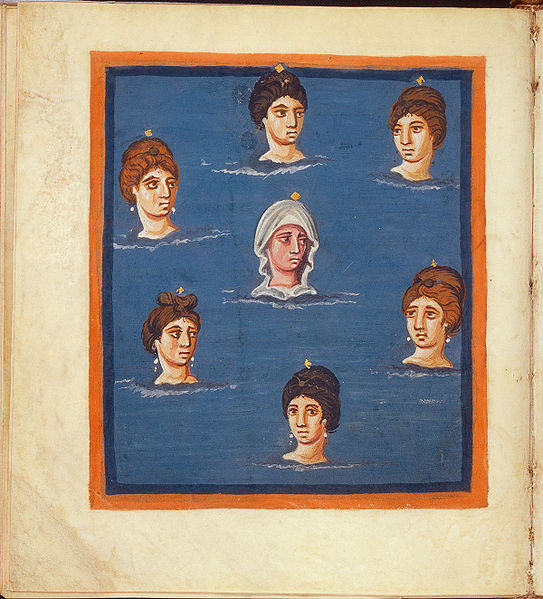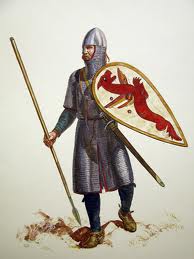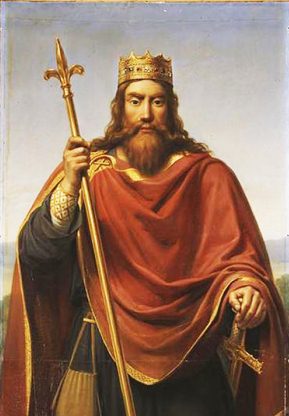Exegesis According to the Rules of Philosophy or the Rule of Faith?: Methodological Conflict in the Ninth-Century Predestination Controversy
The development of biblical exegesis, as Contreni shows, was rapid, but not homogeneous. On the one hand, one of the main ways to acquire biblical wisdom was to rely on the interpretations and teaching of the Holy Fathers, whose texts were studied, assimilated, simplified, collected, and taught. On the other hand, Alcuin’s revival of the liberal arts6 paved the way for the rise of another method of biblical exegesis.
Trickster, Convert, Martyr, Saint: Four Ways of Dying in Dudo of St. Quentin’s History of the Normans
I want to push this a bit further here and argue that Dudo was aiming to produce something that we might term sacramentary history, to show the three-fold interaction of the linear time experienced by fallen humanity, the cyclical time in which events are continually re-enacted and foreshadowed in the sacraments, and the unchanging eternity of time as experienced by God.
Hincmar of Reims on King-making: The Evidence of the Annals of St. Bertin, 861–882
The Histories and Chronicles Hincmar had in mind were presumably Frankish ones; and Lothar II, succeeding his father, thus clearly came into this section of Hincmar’s third category. But of the timing or form of Lothar’s becoming king, Hincmar said not a word, preferring, instead, to spell out the Biblical lesson that a bad king (and he hastily disclaimed any allegation that Lothar’s father had been a bad king) would see the succession depart from his line.
John Scotus Eriugena
Eriugena, master of the liberal arts, translator, philologue, poet, philosopher, and theologian, ‘reinvented the greater part of the theses of Neoplatonism’, by his time largely forgotten in the Latin West.
Powerful Women in a Patriarchal Society: Examining the Social Status and Roles of Aristocratic Carolingian Women
The status of aristocratic women hinged on virtue, the ability to manipulate beauty, wealth, marriage status, and Carolingian laws and reforms throughout the ninth century.
The Good, the Bad or the Unworthy? Accusations, Defense and Representation in the Case of Ebbo of Reims, 835-882
In 877, a man fell ill. His name was Bernold, and he was a parishioner in the see of Reims. Bernold received the rites of the dying, did not eat for four days and he was so weak that when he wanted to drink, he could not ask for water.
Non similitudinem monachi, sed monachum ipsum! An Investigation into the Monastic Category of the Person – the Case of St Gall
One day, most likely in the early 880s, the noblest monks of the St Gall monastery assembled to deliberate over an outrageous incident that had occurred the previous night
“At the Tip of a Sword”: A Study of the Introduction of the Knight into Anglo-Saxon England
Nevertheless the introduction of the knight into England still remains a controversial topic of discussion among military historians, since the people who inhabited England prior to 1066 were part of warrior culture as well: the Anglo-Saxons.
Civilization versus Barbarians? Fortification Techniques and Politics in Carolingian and Ottonian Borderlands
In many ways the situation on the north-eastern and eastern frontier of the Carolingian and Ottonian empires is an early medieval replica of phenomena associated with the frontiers of the Later Roman Empire.
Christian Living Explained: Alcuin’s De virtutibus et vitiis liber in a Carolingian Instructional Manual
Another paper from the yesterday’s SESSION I: Lived Religion in the Middle Ages. This paper focused on Alcuin of York’s contribution to the standardisation of Carolingian Christian texts for pastoral instruction.
The ruling as a clue to the make-up of a medieval manuscript
The purpose of this inquiry is to try to reconstruct the original state of the manuscript using ruling as a clue.
Organa doctorum: Gerbert of Aurillac, organbuilder?
He was born a peasant. Yet, through intelligence, political skill and uncommon good luck he came to be one of the most influential people in the Europe of his time…Pope Sylvester II.
Scissors or Sword? The Symbolism of a Medieval Haircut
Simon Coates explores the symbolic meanings attached to hair in the early medieval West, and how it served to denote differences in age, sex, ethnicity and status.
Knowledge of Ephraim’s Writings in the Merovingian and Carolingian Age
The florilegium entitled Liber Scintillarum, the book of sparks from the words of God and of his saints, was composed by the monk Defensor of Ligugé. Our evidence for the life and date of Defensor derives entirely from his preface.
A Distant World: Russian Relations with Europe Before Peter the Great
Despite their isolation and poverty, the Slavic plowmen succeeded in settling this unforgiving region, expanding their numbers, and, most importantly, creating the beginnings of a trading network along the many rivers of the region—the western Dvina, the Volkhov, the northern Dvina, and the Dniepr and its tributaries.
Re-writing discourse features: speech acts in Heliand
Though extremely fascinating and very appealing, the theory of the saxonization and northernization of the Gospel has ended up permeating every single level upon which an analysis of the poem can be carried out, becoming a sort of a priori starting point that may lead scholars to over-interpretation and, therefore, hinder them from developing a perhaps deeper insight into the poem.
Fossa Carolina: The First Attempt to Bridge the Central European Watershed
Beside the intention of Charlemagne to build a continuous waterway network for his extensive travels, there are two more possible reasons for connecting the river systems of Main and Danube.
Dreaming and the Symbiotic Relationship Between Christianity and the Carolingian Dynasty
Setting out to understand the role of dreams during the Carolingian period it is important to note that the dreams to which we have access are those that have been recorded and survived as physical documents for approximately twelve centuries.
Eriugena: The Medieval Irish Genius Between Augustine and Aquinas
Carolingian thinker Johannes Scottus Eriugena (810-877 CE) is the author of numerous philosophical and theological works.
Plenary Session: Learning the Law in the Carolingian Empire
How did Carolingians learn canon law? This paper examines lay knowledge of canon law during the Carolingian period.
Classical and Secular Learning among the Irish before the Carolingian Renaissance
Classical and secular learn ing maintained their close association with each other until the end of antiquity, when they gradually became divorced.
The Public Penance of Louis the Pious: A New Edition of the Episcoporum de poenitentia, quam Hludowicus imperator professus est, relatio Compendiensis (833)
For centuries, the reign of Charlemagne’s son and sole heir, Louis the Pious (r. 814-840), has largely been remembered and understood as one marked by controversy.
Medieval reads for Dad!
Father’s Day is just around the corner – here are some fun medieval reads to make his day special!
Alternatives to Ptolemy: Astronomy in Carolingian Schools
But was there any real science in those tumultuous times?
Glossaries and Other Innovations in Carolingian Book Production
Carolingian book production needs to be understood within the context of the communication of knowledge, the transmission of ideas across time and space and the consequent formation of what can be described as a cultural map in Europe.













